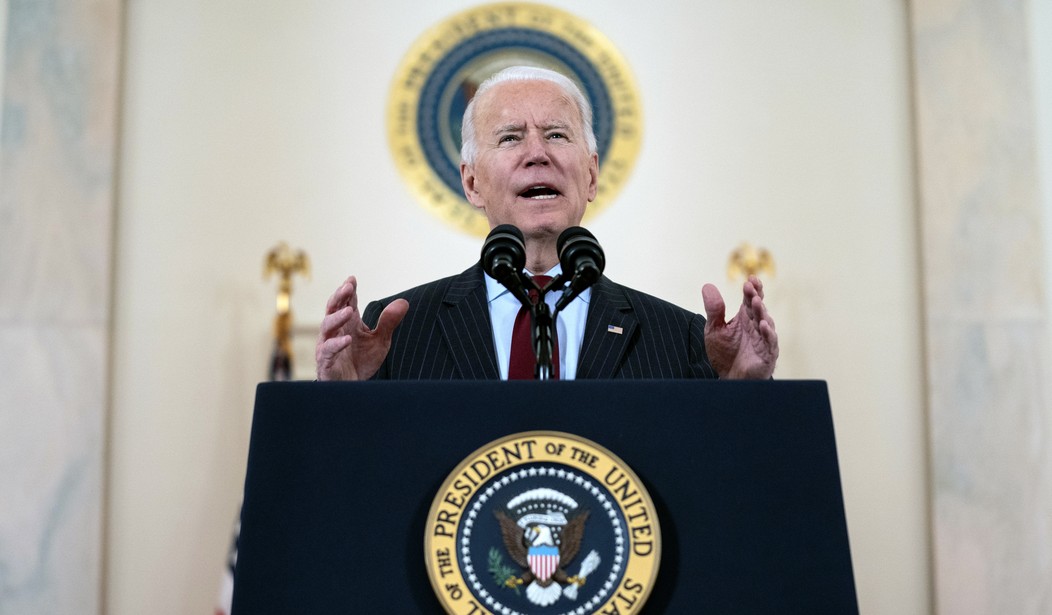We’re not even four months into the Generic Not-Trump Administration, and Democrats have already begun to complain over its leadership. After having billed himself as a man who could bridge both generational and ideological chasms within the party, Joe Biden instead finds himself at the center of those “fissures,” The Hill’s Alexander Bolton reports. From the border to Israel and tax policy, the honeymoon has ended:
Fissures within the Democratic Party are starting to open up after a three-month period in which liberals and centrists showed impressive unity at the opening of Joe Biden’s presidency. …
Yet in recent days and weeks, the divides in the party that have always been present have opened up over issues near and far, from foreign policy to tax and spending issues central to Biden’s domestic agenda.
Consider this a somewhat-rare-but-increasing data point on internecine fights among Democrats. We get plenty of these stories about Republicans, and often for good reason; the Liz Cheney-Kevin McCarthy is a legit big deal, for instance, even if the fight is as far from policy as it gets.
In contrast, Bolton’s story is almost entirely focused on policy differences. The fighting in Israel is one of the more immediate rifts splitting the progressives who sympathize with the Palestinians from the more old-school Democrats aligned with Israel:
Sen. Chris Van Hollen (D-Md.), a member of the Senate Foreign Relations Committee, weighed in over the weekend, tweeting that “evictions of families in East Jerusalem would violate international law.”
Progressive Democrats dissatisfied with the Biden administration’s soft handling of the situation in Israel will have leverage when Biden nominates his ambassador to Israel, who will have to go through Senate confirmation.
But some Democrats are pushing back on characterizations by colleagues that plans to relocate Palestinian families in East Jerusalem are illegal or violations of international law.
“I’m glad he’s come to that conclusion,” Senate Foreign Relations Committee Chairman Bob Menendez (D-N.J.) said with a faint hint of sarcasm when asked about Van Hollen’s pronouncement.
The conflict isn’t limited to foreign policy, where Democratic majorities on Capitol Hill don’t have much direct influence. It includes a demand to repeal the caps on state and local tax (SALT) deductions, which splits the caucus in a different fracture. On one side, Democrats have rich blue-state representatives who want to protect their investor class, primarily in New York, New Jersey, and California, while on the other side they have progressives who see this as a tax break for the wealthy — and tax-and-spenders who don’t want to lose the massive revenue the SALT cap allows (nearly $70 billion a year). Toss in demands for spending on hobby-horse agenda items, Medicare for All, and so on, and it’s becoming a mess.
But why now? Barack Obama led a coalition similarly fraught with these kinds of splits and differences, but he didn’t have this kind of open slapfights going on in Month 4. If anything, expectations were even higher under Obama, thanks to the commanding Democratic majorities in both chambers of Congress. It took much longer for these conflicts to rise to the surface in any significant way, and the same was true with Bill Clinton, who only faced that kind of home-party pushback after he began his “triangulation” strategy after the midterm debacle of 1994.
The difference is in the leadership, not the coalition. Biden came to office on a wave of hope among his rank and file, especially after the January 6th riot and sacking of the Capitol. It has become painfully clear ever since that Biden has no real plan for governing, and even no real plan for getting a legislative agenda pushed through Congress. He’s making it up as he goes along, offering entirely reactive initiatives with no overarching strategy or plan. That has his party’s interest groups jockeying openly to push Biden around, rather than having Biden enforce discipline with a clear strategy and detailed plan.
That’s a recipe for a short honeymoon … and all sorts of strategic failures. Democrats had better get used to it, and had better hope that Republicans remain stuck on the Trump issue for the next eighteen months. On that latter point, Democrats may well get lucky.







Join the conversation as a VIP Member